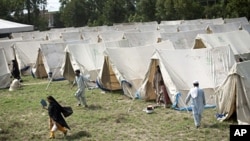The sound of steady rainfall is not uncommon for Pakistan during the monsoon season of July and August. But this year's deluge brought what many Pakistanis call the worst flood in living memory.
Authorities are evacuating thousands of residents from Punjab province, where the flooding has spread, destroying homes and farmland. But even as the evacuation efforts turn south, nearly two million villagers in the mountainous northwest, where the rains began last week, say they still need help.
Fayyaz Talat now lives in a makeshift tent at a camp for the displaced in Charsada. He says his family is in deep, deep trouble.
"It is hot in the sun and if it rains, water comes in everywhere. There is no toilet for them in this camp. Everywhere is devastation. We have lost our homes and animals, struggled to save their lives. Children are suffering from sickness," Talat said.
Babu Lal Zaman shows the damage to his property near the city of Peshawar, after nearly four meters of water flooded it. He says they waited for the government to come for five days, but no one from the local administration, nor politicians from any party showed up. His family, he said, is really in trouble.
A fellow villager shares his story, saying his children need water. Women have given birth in these conditions, he said, and they were crying for water. No one was there to help them, he said.
The needs of flood victims have quickly expanded beyond evacuation and shelter, said Dr. Tahir Shah, who is working at a displaced persons camp.
Shah said most patients are suffering from three or four waterborne diseases, gastro-intestinal problems, chest infections and skin problems. The main cause, he said, is dirty flood water.
Former prime minister and opposition leader Nawaz Sharif had harsh criticism for the government's efforts to cope with the disaster.
"This is a sad event, but the government's progress is not satisfactory. If the government had made good efforts the situation would have been better. In this event the government has not played a good role." said Sharif.
But retired Lieutenant-General Nadeem Ahmad, head of Pakistan's National Disaster Management Authority, defended the government's response. He said the scope of the disaster was beyond expectations and poor weather has hampered rescue efforts.
"The devastation is historic. But the government has stabilized the situation after five days without any private help," Ahmad said. "It was an incredible job."
Tens of thousands of troops are spearheading rescue efforts with boats and, weather permitting, helicopters. Government officials estimate that at least 1,500 people have been killed and 100,000 others rescued.
But as the flood spreads and the risk of disease increases, officials say they expect the death toll to rise.
Pakistani Government Faces Criticism for Flood Response




